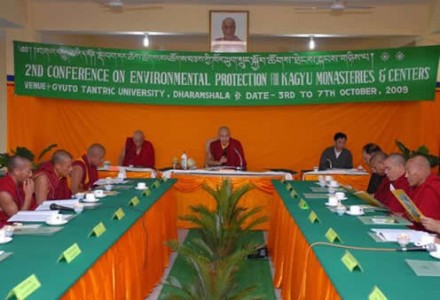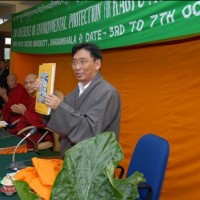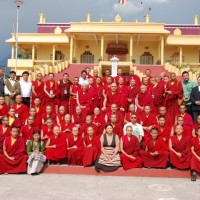
Dharamshala: Representatives from 33 Kagyu monasteries and nunneries from across India, Nepal and Bhutan, joined environmentalists and researchers to discuss ways to protect environment during a conference held at Gyuto Monastery in Dharamsala, from 3 – 8 October.
His Eminence the 17th Gyalwang Karmapa Ogyen Trinley Dorje opened the second conference on environmental protection. Kalon Paljor Tsering Chope, Kalon for the Department of Health, attended the conference. The conference is an initiative of Gyuto Monastery.
Kalon Paljor Tsering spoke on the detrimental effects on the environment caused by material progress and lack of human concern. He highlighted issues of environmental degradation and health problems caused by hazardous waste such as acid rains and polluted water and air.
Lauding the efforts of Gyalwang Karmapa for raising awareness on environmental issues and initiating an environmental protection movement, Kalon Paljor Tsering expressed hope that the movement would grow steadily and spread throughout the world.
Kalon Paljor Tsering launched the Tibetan edition of the Gyalwang Karmapa’s booklet on environmental issues titled “Guidelines for Karma Kagyu Buddhist Monasteries, Centers and Community”.
In his address, Gyalwang Karmapa underscored the need for concerted and holistic approach in protecting the environment.
“For too long, people have behaved thoughtlessly and ignored the damage to the environment that they are creating and, if this continued there was a great danger that it would be too late to do anything,” Gyalwang Karmapa said.
Gyalwang Karmapa spoke in detail on ecology and Buddhism.
Ms. Dekil Chungyalpa, the conference facilitator, who works for the World Wildlife Fund, U.S.A., based in Washington, D.C., gave an overview of the five environmental issues which form the core of the Environmental Guidelines booklet and provided information on the latest scientific findings.
Mr. Sanjeep Pradhan, from World Wildlife Fund India, gave a lively presentation on forest conservation and explained the importance of forests and plants and the critical role they play in supporting not just human life but a vast biodiversity and controlling levels of carbon dioxide and oxygen.
Dr Anjan Kumar Kalia, from Him Renewable Energy Consultants, gave a clear and comprehensive presentation on waste management.
Other important issues that were also discussed included Noted environmentalists and researchers spoke on wide a restoring spring water sources, wildlife protection and the effects of climate change on Tibet.
Researchers from Environment & Development Desk of the Department of Information and International Relations, Tesi Environmental Awareness Movement and Wildlife Trust of India took part in the conference.
The monasteries and nunneries presented their activities that they implemented under the guidelines, such as planting trees and recycling of plastics.
Gyalwang Karmapa has decided to create a website which will feature the work of the Kagyu environmental protection movement and detail environmental work and development in Kagyu monasteries and nunneries.
The monastic community reaffirmed their efforts to lead on environmental and wildlife protection issues


